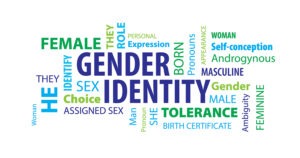Guest blog post on interpreting and gender identity by Jacqueline Hinds, Spanish Certified Healthcare Interpreter™ and Language Access Training Specialist at Mosaic

Did you know that Mosaic offers extensive interpreting and translation services? I am proud to have been a Language Access Specialist with Mosaic for ten of my 15 years with the organization. I’d like to share a patient story with you that highlights two things well: Mosaic’s Mission and Core Values and the National Code of Healthcare Interpreter Ethics and Standards of Practice.
Supporting a patient in transition
I have been working with an adolescent patient in the process of coming out as transgender to their family. This young person has received excellent support from one of our Mosaic Behavioral Health Consultants (BHC). The BHC has supported the patient in the process of approaching their transition with loved ones. Those conversations have included communication to see if their parent would use their new preferred name and pronouns. Often, after consulting with the BHC before an appointment with this patient I found that I would not need to interpret after all. The patient spoke English, and if the parent did not attend, my services were not required. However, when the patient’s parent was present, I was ready to interpret.
Communication and clarity
Our BHC was under the impression from patient input that their parent was not supportive of their transition. But once we were able to get the parent on the phone, they actually expressed support. This is one way the interpreting ethic of impartiality came into play. As the interpreter, I had to really focus on the current message, so that each individual was fully understood and well-represented by their words. I could not let previously shared information inform how I interpreted the current conversation.
Professional interpreting support helped this family make some inspiring progress. The professional partnership between the BHC and myself as the interpreter supported this patient and their parent to clarify their needs and feelings. With improved mutual understanding, they were able to reach agreements. The patient and parent were able to move forward with discussion regarding informing other family members about the patient’s gender identity and transition.
Shared learnings
I found that this whole experience helped me to renew my focus on the need to be impartial. It really stretched my cognitive capacity to relay messages accurately when both female/male pronouns and legal/preferred name were being used in the same conversation.
I’d like to share a few tips I’ve learned to help others in similar situations. The below concepts are adapted from the National Council on Interpreting in Health Care Interpreter Ethics and Standards of Practice and The Community Interpreter™ .
Tips for Interpreters and clinicians supporting sensitive conversations
Reflective practice
- Stay alert to the learning opportunities within each experience
- Remain aware of how you personally might act in a similar situation
Remain impartial
- Make no assumptions and maintain a willingness to understand what is actually said in the moment (versus holding on to impressions or biases)
- Do not allow your personal beliefs to inform how you interpret
- Remain faithful to the original message no matter what
Remember communicative autonomy
- Respect the ability of each party to remain responsible for and in control of their own communication
Always show respect, professionalism and cultural awareness
Thank you for taking the time to read about this experience, and for being open to considering or reconsidering another point of view.



0 Comments